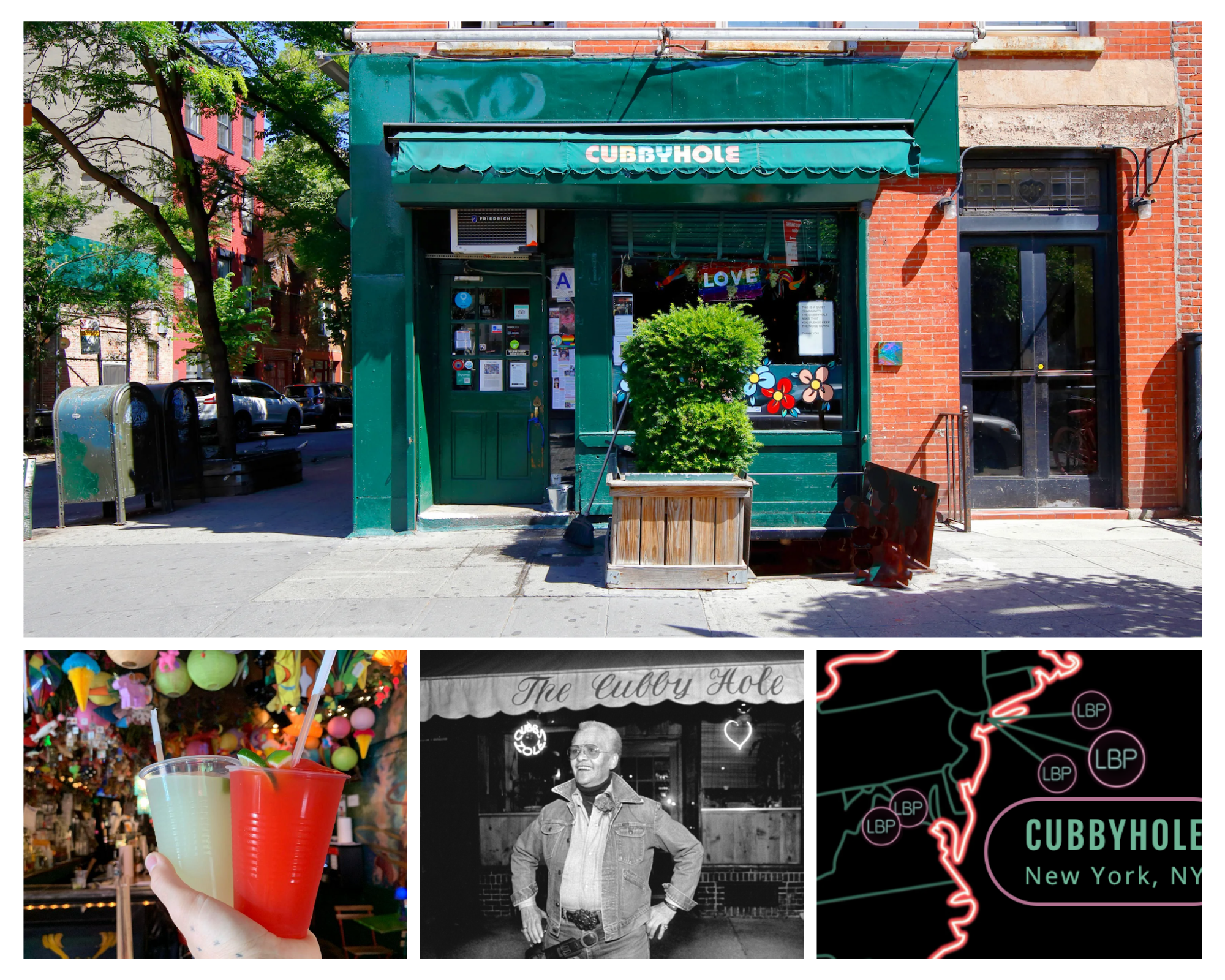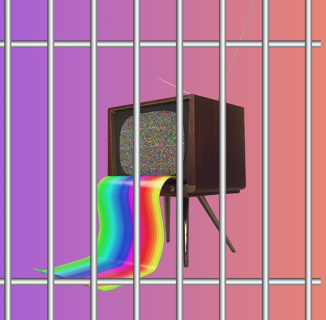CW//Suicide
When I lived in New York, I loved going to the Cubbyhole.
There were other gay bars in the city at that time, and I went to those as well: Boxers, where swole bartenders wore nothing but briefs under neon lighting. Sugarland, where you could freely squirt glow-in-the-dark paint out of condiment bottles. Metropolitan, where Drag Race played on Wednesdays. Pieces, where you could belt out Kesha and “Poor Unfortunate Souls” to your heart’s content. I was too late for Rose’s Turn, but Pieces did just fine for our needs. But nothing felt like home like The Cubbyhole, which recently reopened after the pandemic almost took it out of business completely.
View this post on Instagram
The Cubbyhole, for those not in the know, is New York’s oldest surviving lesbian bar. It is, at this point in time, one of the very few lesbian bars to survive in America. The problem of the disappearing lesbian bar (and neighborhood gay bar) is one we’ve had for awhile, necessitating actions like Save Our Spaces and the Lesbian Bar Project. But the Cubbyhole feels like it could never be taken away, even though it definitely could.
The minute I set foot inside sometime in 2011, I understood why. Because it’s exactly what it sounds like. It’s small, intimate, cozy. There are pinatas and party decorations on the ceiling and the $2 margaritas are strong. If I remember correctly, there’s a jukebox. It’s close to that shitty Two Boots that absolutely hits the spot when you’re wasted and don’t really care what goes in your mouth. And the clientele is all lesbian, from what one can tell. It’s the only place I’ve ever, to my knowledge, gotten hit on, and it’s the only place where I talked to someone who had a positive opinion of the Michigan Womyn’s Music Festival. And yes, they were the same person. I don’t know if they knew I was trans. I don’t know if anyone who ever saw me at the Cubbyhole knew I was trans. It was the one place where disclosure of that kind just didn’t seem important.
Queer life in New York is hard, especially if you don’t quite fit in anywhere. I remember talking to my friend at work about how other people saw New York versus how we saw it. “Everyone’s like ‘wow, it must be so exciting to live in New York, you must go to all the clubs!’ I’m like yeah the club that is my couch.”
I realized quickly upon arrival that I didn’t actually know how to do anything. I didn’t know how to date or make friends. I didn’t even know how to walk into a bar by myself. I only knew how to hate myself.
But gay bars had to be for me. I put myself in those spaces not knowing their history or knowing what they meant, but knowing that they were some sort of home for me. They had to be, because it’s New York, and New York is famously awful.
View this post on Instagram
I went to New York for undergrad and stayed there until 2014, when I absolutely could not stay there any longer. I hated New York from almost the minute I landed there, but of course I convinced myself to stay way past my welcome.
I put myself in those spaces not knowing their history or knowing what they meant, but knowing that they were some sort of home for me.
There never was a real welcome, though. New York doesn’t do welcomes. It doesn’t care whether you stay or go, and when you leave the feeling is “don’t let the door hit you on the way out.” After graduating, I got a job at a magazine making less than minimum wage. I rode an hour back and forth the work each way, lugging my huge Vizio laptop with me. I schlepped 20 minutes to the subway stop and back, because the train that would take me to my local stop arrived precisely every 45 minutes and if you happened to miss it, tough shit. I came back to my Crown Heights apartment each night to find several mice softly dying on the kitchen floor, stuck to those horrible glue traps we used. I moved to another apartment in Fort Greene, a lightless, ground-level hole. Then to another apartment where the ceiling was leaking.
This is why it was important to find places that are more like home than whatever shitheap I’d managed to find on Craigslist. Because those shitheaps never felt like home: just lonely, mouse-infested sites of human (and rodent) misery.
So I’d go to the Cubbyhole, where the same bartender (Geeta) was often working, and ask her to make me a medicinal-tasting margarita. I would take my friends there, all straight girls, many of whom I hadn’t realized I was in love with yet. During a particularly packed night at the Hole, someone tried to grab me on the way to the bathroom. I saw a woman who looked like she belonged to a post-punk band whose name I’d forgotten. I saw how it made the straight girls feel to be hit on by butch lesbians, the kind of power it gave them. I saw the place when it was packed and when it was deserted. One time when the bar was almost empty, I saw a mouse scurry across the floor. My friend shrieked and jumped to get out of its way. I made up my mind that day that I didn’t ever want to visit a bar where a mouse didn’t scurry across the floor.
View this post on Instagram
New York can be extremely disgusting and dirty, from the bathtubs that never get clean no matter how much you scrub them to that one car of the subway that you know is empty for a reason. But it can also be unbearably clean. Often enough I had to enter buildings where real people worked—people who make real money and seem to belong more than I did for this reason. I remember going to those buildings, gasping at those art deco elevators that would go up 300 floors and being acutely aware of my own smells, my own filthiness. I wore three separate Ace bandages to bind my chest and every so often I’d catch a whiff of them, sweat-soaked and horrible. All my clothes—$3 shirt packs from Hanes—had pit stains. I felt constantly dirty, ugly, and badly dressed. I couldn’t afford to look like a real person is supposed to look in New York, so I assumed I just didn’t have it in me to be one at all. At the Cubbyhole, however, or Pieces, or even Henrietta Hudson’s Bar and Girl, it didn’t matter. I could be as dirty as you wanted. We were all gay there. Dirt was part of why queer folks come to New York. Because dirt—say whatever else you want about it—is real.
I couldn’t afford to look like a real person is supposed to look in New York, so I assumed I just didn’t have it in me to be one at all
There were others reasons I needed the Cubbyhole. It was a place to take in the everyday horrors of life and just sit with them, drink in hand. One day we all went into work at the magazine after a long weekend. We worked with someone in ad sales named Megan, a tall redhead who I thought might have been trans, but I was too scared to ask. I didn’t want to blow her cover if she was, and I didn’t want to be disappointed if she wasn’t. All I knew was that I liked her, and that she looked hunted all the time, which contributed to my trans theory. That morning we found out she’d killed herself. Someone actually screamed. People covered their mouths with both hands. It was shocking and horrible and no one knew what to do.
I don’t remember what I did that night, but I probably went to the Cubbyhole. Because that’s what I always did. I probably went to the place where you’d no sooner sit down than hear “Suffer Little Children” piping through the speaker as if to say, “you’re safe here.” It wasn’t a safe space, and I wasn’t a lesbian, but it was my place. It wasn’t a place where everybody knew my name, because I never gave it out. But it was as close to anything like a home I ever had in New York. And I miss it.
The rest of New York, however, can go straight to hell.♦
Help make sure LGBTQ+ stories are being told...
We can't rely on mainstream media to tell our stories. That's why we don't lock our articles behind a paywall. Will you support our mission with a contribution today?
Cancel anytime · Proudly LGBTQ+ owned and operated
Read More in Culture
The Latest on INTO
Subscribe to get a twice-weekly dose of queer news, updates, and insights from the INTO team.
in Your Inbox















